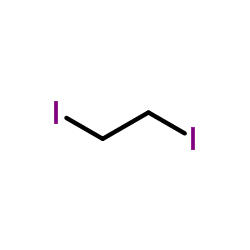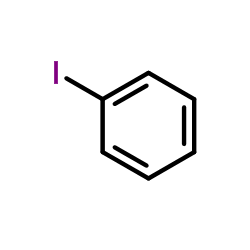13813-22-4
| 中文名 | 碘化镧(III) |
|---|---|
| 英文名 | triiodolanthanum |
| 英文别名 |
Lanthanum triiodide
MFCD00049470 Lanthanum(III) iodide EINECS 237-465-6 lanthanum iodide LaI3 |
| 密度 | 5.63 g/mL at 25 °C(lit.) |
|---|---|
| 熔点 | 772ºC(lit.) |
| 分子式 | I3La |
| 分子量 | 519.61900 |
| 精确质量 | 519.62000 |
| LogP | 2.65710 |
| 外观性状 | beads |
| 储存条件 | 常温密闭,阴凉通风干燥惰性气体下 |
| 稳定性 | 常温常压下稳定 避免的物料 水分/潮湿 光 |
| 分子结构 | 1、摩尔折射率:无可用的 2、摩尔体积(cm3/mol):无可用的 3、等张比容(90.2K):无可用的 4、表面张力(dyne/cm):无可用的 5、介电常数:无可用的 6、极化率(10-24cm3):无可用的 7、单一同位素质量:519.619729 Da 8、标称质量:520 Da 9、平均质量:519.6189 Da |
| 计算化学 | 1.疏水参数计算参考值(XlogP):无 2.氢键供体数量:0 3.氢键受体数量:0 4.可旋转化学键数量:0 5.互变异构体数量:无 6.拓扑分子极性表面积0 7.重原子数量:4 8.表面电荷:0 9.复杂度:8 10.同位素原子数量:0 11.确定原子立构中心数量:0 12.不确定原子立构中心数量:0 13.确定化学键立构中心数量:0 14.不确定化学键立构中心数量:0 15.共价键单元数量:1 |
| 更多 | 1. 性状:无色鳞片状晶体。 2. 密度(g/mL,25/4℃):未确定 3. 相对蒸汽密度(g/mL,空气=1):未确定 4. 熔点(ºC):168-717 5. 沸点(ºC,常压):未确定 6. 沸点(ºC,5.2kPa):未确定 7. 折射率:未确定 8. 闪点(ºC):未确定 9. 比旋光度(º):未确定 10. 自燃点或引燃温度(ºC):未确定 11. 蒸气压(kPa,25ºC):未确定 12. 饱和蒸气压(kPa,60ºC):未确定 13. 燃烧热(KJ/mol):未确定 14. 临界温度(ºC):未确定 15. 临界压力(KPa):未确定 16. 油水(辛醇/水)分配系数的对数值:未确定 17. 爆炸上限(%,V/V):未确定 18. 爆炸下限(%,V/V):未确定 19. 溶解性:可溶解的 |
|
Section 1: Product Identification Chemical Name:Lanthanum (III) iodide, anhydrous (99.9%-La) (REO) CAS Registry Number:13813-22-4 Formula:LaI3 EINECS Number:237-465-6 Chemical Family:metal halide Synonym:Lanthanum triiodide
Section 2: Composition and Information on Ingredients IngredientCAS NumberPercentACGIH (TWA)OSHA (PEL) Title Compound13813-22-4100%no datano data Section 3: Hazards Identification Irritating to skin, eyes and respiratory tract. May be harmful if swallowed. Prolonged exposure may produce a Emergency Overview: mild toxic syndrome known as iodism. Primary Routes of Exposure:Contact with skin and eyes. Inhalation of dust. Eye Contact:Contact with eyes causes irritation. May cause redness and pain. Skin Contact:Causes irritation to skin. Symptoms include redness, itching, and pain, pimples, boils, hives and blisters. Inhalation:Causes irritation to the respiratory tract. Symptoms may include coughing and shortness of breath. Ingestion:Large oral doses may cause irritation to the gastrointestinal tract Acute Health Affects:Irritating to skin, eyes and respiratory tract. Chronic ingestion of iodides may produce iodism. Symptoms include skin rash, running nose, headache and Chronic Health Affects: irritation of mucous membranes. NTP:No IARC:No OSHA:No SECTION 4: First Aid Measures Immediately flush the eyes with copious amounts of water for at least 10-15 minutes. A victim may need Eye Exposure: assistance in keeping their eye lids open. Get immediate medical attention. Wash the affected area with water. Remove contaminated clothes if necessary. Seek medical assistance if Skin Exposure: irritation persists. Remove the victim to fresh air. Closely monitor the victim for signs of respiratory problems, such as difficulty Inhalation: in breathing, coughing, wheezing, or pain. In such cases seek immediate medical assistance. Seek medical attention immediately. Keep the victim calm. Give the victim water (only if conscious). Induce Ingestion: vomiting only if directed by medical personnel. SECTION 5: Fire Fighting Measures Flash Point:not applicable Autoignition Temperature:none Explosion Limits:none Extinguishing Medium:None. Material is non-flammable. Special Fire Fighting Procedures:No special fire fighting procedures required. Hazardous Combustion andnone Decomposion Products: Unusual Fire or Explosion Hazards: No unusual fire or explosion hazards. SECTION 6: Accidental Release Measures To avoid raising dust, small spills may be mixed with diatomaceous earth, sand, vermiculite or other suitable Spill and Leak Procedures: inert material and swept up. SECTION 7: Handling and Storage Store solid in a tightly sealed container away from moisture. Handle under a dry atmosphere of air or nitrogen. Handling and Storage: Prolonged exposure to the atmosphere may degrade the product. SECTION 8: Exposure Controls and Personal Protection Eye Protection:Always wear approved safety glasses when handling a chemical substance in the laboratory. Skin Protection:Wear protective clothing and gloves. Consult with glove manufacturer to determine the proper type of glove. Ventilation:Material may form a fine dust. If possible, handle the material in an efficient fume hood. If in form of fine dust and ventilation is not available a respirator should be worn. The use of respirators Respirator: requires a Respirator Protection Program to be in compliance with 29 CFR 1910.134. Ventilation:Material may form a fine dust. If possible, handle the material in an efficient fume hood. Additional Protection:No additional protection required. SECTION 9: Physical and Chemical Properties Color and Form:off-white to red pwdr. Molecular Weight:519.62 Melting Point:772° Boiling Point:no data Vapor Pressure:no data Specific Gravity:5.63 Odor:none Solubility in Water:very soluble SECTION 10: Stability and Reactivity Stability:hygroscopic Hazardous Polymerization:no hazardous polymerization Conditions to Avoid:contact with moisture Incompatibility:halogens and oxidizing agents Decomposition Products:none SECTION 11: Toxicological Information RTECS Data:No information available in the RTECS files. Carcinogenic Effects:no data Mutagenic Effects:no data Tetratogenic Effects:no data SECTION 12: Ecological Information Ecological Information:No information available SECTION 13: Disposal Considerations Disposal:Dispose of according to local, state and federal regulations. SECTION 14: Transportation Shipping Name (CFR):Non-hazardous Hazard Class (CFR):NA Additional Hazard Class (CFR):NA Packaging Group (CFR):NA UN ID Number (CFR):NA Shipping Name (IATA):Non-hazardous Hazard Class (IATA):NA Additional Hazard Class (IATA):NA Packaging Group (IATA):NA UN ID Number (IATA):NA SECTION 15: Regulatory Information TSCA:Listed in the TSCA inventory. SARA (Title 313):Title compound not listed. Second Ingredient:none SECTION 16 - ADDITIONAL INFORMATION N/A |
|
毒理学数据: 1、急性毒性:主要的刺激性影响: 在皮肤上面:刺激皮肤和粘膜; 在眼睛上面:刺激的影响;没有已知的敏化影响。 生态学数据: 通常对水体是稍微有害的,不要将未稀释或大量产品接触地下水,水道或污水系统,未经政府许可勿将材料排入周围环境。
|
| 符号 |

GHS07 |
|---|---|
| 信号词 | Warning |
| 危害声明 | H315-H319-H335 |
| 警示性声明 | P261-P305 + P351 + P338 |
| 个人防护装备 | dust mask type N95 (US);Eyeshields;Gloves |
| 危害码 (欧洲) | Xi: Irritant; |
| 风险声明 (欧洲) | R36/37/38 |
| 安全声明 (欧洲) | 26 |
| 危险品运输编码 | NONH for all modes of transport |
| WGK德国 | 3 |
|
~% 
13813-22-4 |
| 文献:Inorganica Chimica Acta, , vol. 144, p. 143 - 146 |
|
~% 
13813-22-4 |
| 文献:Inorganica Chimica Acta, , vol. 144, p. 143 - 146 |
|
~% 
13813-22-4 |
| 文献:Journal of the Chemical Society [Section] A: Inorganic, Physical, Theoretical, , p. 1931 - 1934 Sc: MVol.D6, 1.2, page 147 - 148 |
|
~% 
13813-22-4 |
| 文献:Journal of the Chemical Society [Section] A: Inorganic, Physical, Theoretical, , p. 1931 - 1934 Sc: MVol.D6, 1.2, page 147 - 148 |






